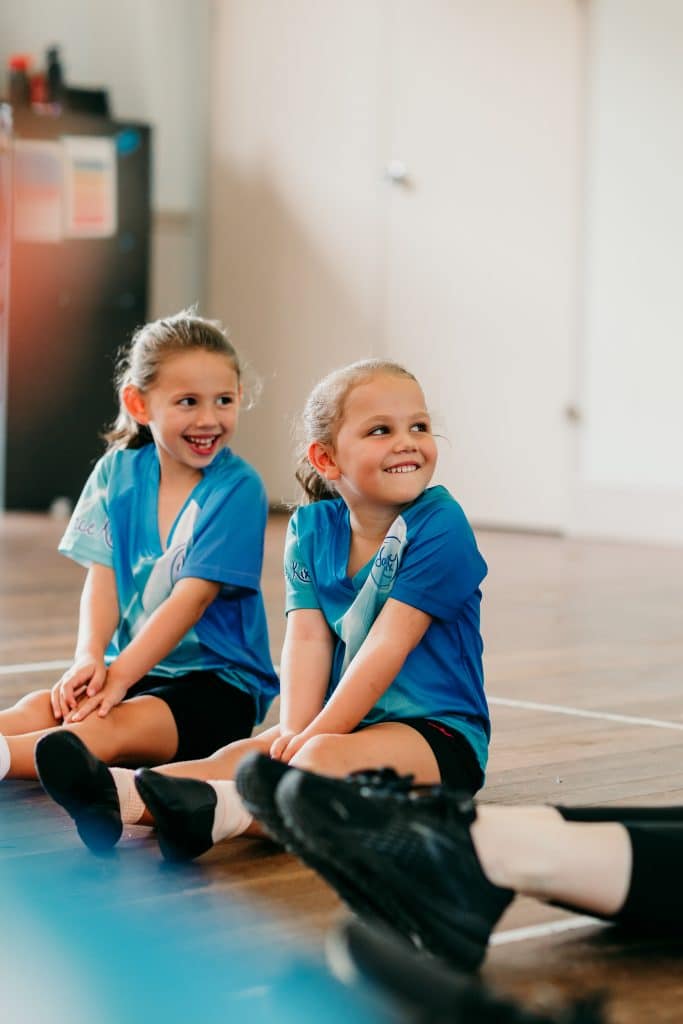Starting dance is an exciting and sometimes overwhelming experience for young dancers and their families. We often have parents asking us what to expect in the first few weeks of their child joining a class. This is a great question! Knowing what to expect can put your mind at ease, especially if if not everything goes the way you may have imagined it.
It’s well known amongst dance teachers that preschool dance classes can be a little crazy for the first few weeks of term, for a number of different reasons;
In the first week, children can become over stimulated with a new environment, new teachers, new classmates and the dancing itself, that’s a lot for an adult to take in, let alone a little tot! This can lead to tears, and shyness or at the other end of the scale – showing off and misbehaving. All of these behaviours are very normal, and our teachers are prepared for this. Time will resolve all the initial chaos as students become accustomed to their teacher and the class format.
There are some ways that parents can help make the transition into dance as smooth and as positive as possible, and we invite you to take the time to read the information below.
Set expectations in advance
Children become anxious when they do not know what to expect. Start talking to your dancer now about what they can expect when they start at Dance Kix. Let them know that when they arrive in the studio they will wait in the waiting area until they are greeted and welcomed into the dance space by their teacher. We always start our class by sitting in a circle. Once class has started the doors will be closed and parents are asked to wait outside the room, but reassure them you will be waiting for them while they enjoy their class. By talking about the dance class in advance your dancer will feel more confident and secure at their first class.
Teach your child their teacher’s name
When talking to your child about what to expect in dance class be sure to teach them their teacher’s name. Your child will feel more comfortable communicating their needs to their teacher if they know how to address them. If a “toilet” accident happens it is generally because the child did not know how to let their teacher know that they had to go!
Use the bathroom BEFORE class!
Your child may have gone to the bathroom prior to leaving the house, but when children are feeling anxious they may constrict their muscles and may not fully relieve themselves. Take 10 minutes prior to class as an opportunity to use the bathroom. Nothing creates a more negative experience for a young child than having an accident in class.
Be on time
Ensure that you have ample time to allow your little one the grace of popping their drink bottle and outside shoes and tap in the designated area. It is also essential that the teacher has a few seconds to greet your little dancer, before the class begins. We try to partner all new students with a ‘dance buddy’, so that they feel instantly connected with the other students and part of the group. Being late only leads to stress and increased anxiety for both you & your tiny dancer.
Help us get to know you & your tiny dancer
Every child is different in their needs and they way they respond to new situations. If your child has a very specific need, it can be useful to provide your teacher with a few tips about how to best work with your child and integrate them into class. With this information your teacher will be well equipped to provide your child with the best possible dance experience!
Tears are very normal
Given the tender age of our tiny tots, quite often excitement and nerves can manifest into tears. This is very normal and common, so don’t be worried that if your child’s first lesson isn’t smooth sailing. As teachers, we expect this, and in many cases it can last 2-3 weeks. Sometimes it can hinge on the events of the day, such as not having a nap or having a busy day, being a tad hungry or even just having an off day (like we all sometimes do). Stay positive, and support your child while they adjust to their new dance environment.
No need to push or rush your child’s participation
Every child learns and adapts to new situations differently. Some children jump into class right away, while others need time to observe before they will participate. This is often related to their learning style. No learning style is better than the other, just different. It can be frustrating to see your child watching rather than participating but it is best if children are given time to come into the activities in their own time as they will be more successful in the long run. Your child’s teacher should let you know if they have any concerns about your child’s participation in class.
Allow your child the opportunity to express themselves
Freedom of expression is empowering to young children. After each dance class ask your child to share with you what was the best part of class and the worst part of class. Sharing the best part of class allows your child to reflect on what they enjoy about dance and gives you insights into your child’s preferences. Sharing the worst part of class allows your child the opportunity to acknowledge something that is challenging for them, and gives you the opportunity to provide them with support if needed. It is OK for your child not to love every minute of class, often when children feel challenged by something new it can take some time for it to become easier and therefore more enjoyable. Even adult dancers have their best and worst parts of class. It is also quite normal for them to say very little about their class, this can be an indication that the are tired after all the mental stimulation and physical activity. You may see a few dance moves emerge a few days after, and that could be the time to ask them more about it.
It is also important to remember that not all children under the age of 5 are developmentally ready for an unparented dance program. If you child is shy, has limited verbal skills, or difficulty regulating their behaviour or impulses, it may be in their best interest to look into a parent and child class. Dance Kix does offer a ‘Dance with Me’ program which is flexible on age limits.
We are always very happy to chat with you about your child, and how we can better their experience when they come to our classes.
Leila Mewburn
Creative Director of Dance Kix

